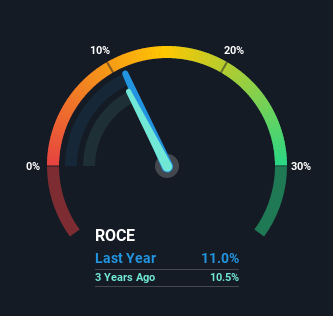The Returns At VMware (NYSE:VMW) Aren't Growing
What trends should we look for it we want to identify stocks that can multiply in value over the long term? Amongst other things, we'll want to see two things; firstly, a growing return on capital employed (ROCE) and secondly, an expansion in the company's amount of capital employed. Put simply, these types of businesses are compounding machines, meaning they are continually reinvesting their earnings at ever-higher rates of return. That's why when we briefly looked at VMware's (NYSE:VMW) ROCE trend, we were pretty happy with what we saw.
Understanding Return On Capital Employed (ROCE)
Just to clarify if you're unsure, ROCE is a metric for evaluating how much pre-tax income (in percentage terms) a company earns on the capital invested in its business. To calculate this metric for VMware, this is the formula:
Return on Capital Employed = Earnings Before Interest and Tax (EBIT) ÷ (Total Assets - Current Liabilities)
0.11 = US$2.3b ÷ (US$29b - US$8.3b) (Based on the trailing twelve months to July 2021).
Therefore, VMware has an ROCE of 11%. That's a relatively normal return on capital, and it's around the 10% generated by the Software industry.
View our latest analysis for VMware
In the above chart we have measured VMware's prior ROCE against its prior performance, but the future is arguably more important. If you'd like to see what analysts are forecasting going forward, you should check out our free report for VMware.
The Trend Of ROCE
The trend of ROCE doesn't stand out much, but returns on a whole are decent. The company has consistently earned 11% for the last five years, and the capital employed within the business has risen 74% in that time. 11% is a pretty standard return, and it provides some comfort knowing that VMware has consistently earned this amount. Stable returns in this ballpark can be unexciting, but if they can be maintained over the long run, they often provide nice rewards to shareholders.
The Bottom Line
In the end, VMware has proven its ability to adequately reinvest capital at good rates of return. And long term investors would be thrilled with the 134% return they've received over the last five years. So while investors seem to be recognizing these promising trends, we still believe the stock deserves further research.
If you want to continue researching VMware, you might be interested to know about the 1 warning sign that our analysis has discovered.
While VMware may not currently earn the highest returns, we've compiled a list of companies that currently earn more than 25% return on equity. Check out this free list here.
This article by Simply Wall St is general in nature. We provide commentary based on historical data and analyst forecasts only using an unbiased methodology and our articles are not intended to be financial advice. It does not constitute a recommendation to buy or sell any stock, and does not take account of your objectives, or your financial situation. We aim to bring you long-term focused analysis driven by fundamental data. Note that our analysis may not factor in the latest price-sensitive company announcements or qualitative material. Simply Wall St has no position in any stocks mentioned.
Have feedback on this article? Concerned about the content? Get in touch with us directly. Alternatively, email editorial-team (at) simplywallst.com.

 Yahoo Finance
Yahoo Finance 
